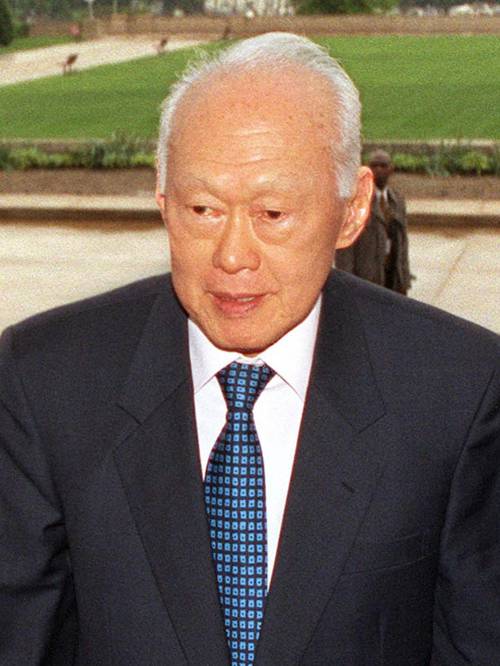
FAQ About Lee Kuan Yew

Who was Lee Kuan Yew?
Lee Kuan Yew was the first Prime Minister of Singapore, serving from 1959 to 1990. He is widely regarded as the founding father of modern Singapore due to his leadership in transforming the country from a developing nation to a highly advanced global financial hub.

What were Lee Kuan Yew's contributions to Singapore?
Lee Kuan Yew is credited with numerous contributions to the development of Singapore, including creating a strong economy, establishing a premier education system, implementing efficient government policies, and ensuring political stability. His economic and urban development strategies helped propel Singapore into one of the world's most prosperous and thriving nations.

When did Lee Kuan Yew serve as Prime Minister of Singapore?
Lee Kuan Yew served as the Prime Minister of Singapore from 1959 to 1990, guiding the city-state through a period of significant political, social, and economic development.

How did Lee Kuan Yew transform Singapore's economy?
Lee Kuan Yew transformed Singapore's economy by implementing a series of astute economic policies focused on attracting foreign investment, enhancing infrastructure, and fostering education and technology development. His policies were instrumental in shifting Singapore from a port city to a global financial and trading hub.

What is Lee Kuan Yew's educational background?
Lee Kuan Yew had an extensive educational background, having attended Raffles Institution and later the London School of Economics before studying law at Fitzwilliam College, Cambridge, where he graduated with a double star first in Law.

Why is Lee Kuan Yew referred to as the founding father of Singapore?
Lee Kuan Yew is often referred to as the founding father of Singapore because of his pivotal role in the city's independence and his leadership in transforming it into a prosperous and stable nation. His vision and policies laid the foundation for Singapore's modern development and success.

What language did Lee Kuan Yew speak?
Lee Kuan Yew was multilingual. He spoke English fluently and was proficient in Mandarin Chinese and Malay. He also had a working understanding of several Chinese dialects, including Hokkien and Cantonese.

What were some challenges Lee Kuan Yew faced during his tenure?
During his tenure, Lee Kuan Yew faced several challenges, including racial tensions, lack of natural resources, housing shortages, and the need to create jobs and attract foreign investment. His ability to address these challenges played a crucial role in the transformation of Singapore.

When did Lee Kuan Yew retire from politics?
Lee Kuan Yew retired from his role as Prime Minister in 1990 but remained in politics and served as Senior Minister and Minister Mentor until his full retirement in 2011.

How is Lee Kuan Yew remembered in Singapore today?
Lee Kuan Yew is commemorated as a transformational leader whose vision and governance vastly improved Singapore's economic stature and quality of life. Monuments, schools, and institutes are named after him, and his impact is deeply ingrained in the nation’s consciousness.

Did Lee Kuan Yew write any books?
Yes, Lee Kuan Yew authored several books, including his memoirs "The Singapore Story" and "From Third World to First." These works provide an in-depth look into his political journey and the strategies he employed to develop Singapore.

Was Lee Kuan Yew recognized internationally for his work?
Yes, Lee Kuan Yew received numerous international accolades and recognition for his visionary leadership and his role in modernizing Singapore. He was admired globally for his pragmatic approach to governance and economic policies.

What is Lee Kuan Yew's legacy?
Lee Kuan Yew's legacy is one of transformative governance and nation-building. He is remembered for his bold vision, policy-making acumen, and ability to implement strategies that made Singapore one of the most developed nations in the world despite its geographic constraints.

How did Lee Kuan Yew handle Singapore's racial diversity?
Lee Kuan Yew addressed Singapore's racial diversity by promoting racial harmony and implementing policies that aligned with meritocracy and multiculturalism. His government prioritized mutual respect and equality, aiming to foster a united national identity.

When was Lee Kuan Yew born and when did he die?
Lee Kuan Yew was born on September 16, 1923, and he passed away on March 23, 2015. His death was marked by national and international mourning, reflecting on his significant contributions to Singapore and beyond.

What were Lee Kuan Yew's political ideologies?
Lee Kuan Yew's political ideologies were rooted in pragmatism rather than strict adherence to classical political doctrines. He believed in a strong central government, economic freedom, social discipline, and the pursuit of meritocracy.

How did Lee Kuan Yew impact Singapore's education system?
Lee Kuan Yew placed a strong emphasis on education as key to Singapore's progress. He reformed the education system to focus on bilingualism and merit-based advancement, which has since produced a highly skilled workforce and contributed significantly to the nation's economic success.

What major infrastructure projects were launched under Lee Kuan Yew's leadership?
Under Lee Kuan Yew's leadership, significant infrastructure projects were launched, including public housing developments by the Housing and Development Board (HDB), the Mass Rapid Transit (MRT) system, and the transformation of Changi Airport into a major international hub.

How did Lee Kuan Yew strengthen Singapore's global relations?
Lee Kuan Yew strengthened Singapore's global relations by cultivating strategic alliances and trade partnerships with major global powers. His diplomatic acumen helped Singapore establish a robust international presence, attracting investments and bolstering its economic position.

What personal qualities characterized Lee Kuan Yew's leadership style?
Lee Kuan Yew was known for his strategic vision, determination, and pragmatic approach to governance. He was often described as being uncompromising and disciplined, with a sharp focus on results. His tenacity and capacity for long-term planning were key attributes of his leadership style.
